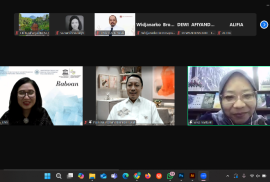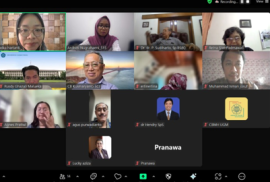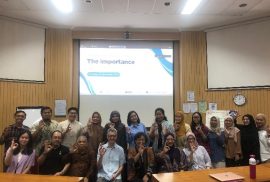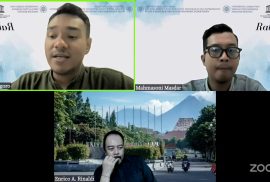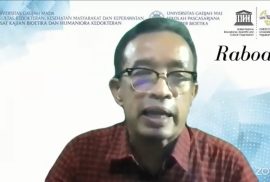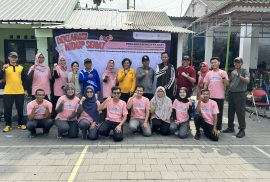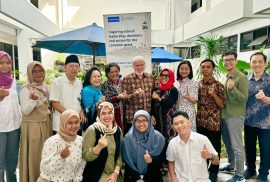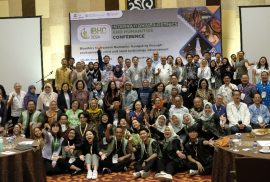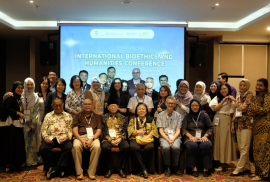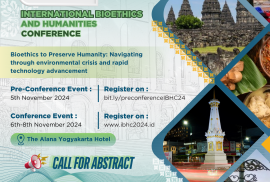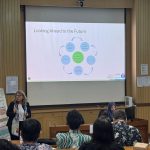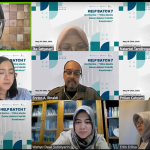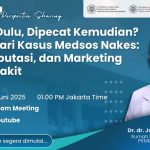Yogyakarta, 8 Januari 2025 – Center for Bioethics and Medical Humanities Fakultas Kedokteran, Kesehatan Masyarakat, dan Keperawatan Universitas Gadjah Mada (CBMH FK-KMK UGM) memulai tahun 2025 dengan Webinar Raboan perdana bertema “Etika dan Tantangan untuk Melindungi Mutu Pendidikan.” Acara ini diadakan secara daring pada Rabu, 8 Januari 2025, dengan pembicara Dr. dr. Veronika Ika Budiastuti, MPd. Webinar membahas berbagai aspek etika dalam penjaminan mutu pendidikan tinggi, termasuk dilema yang dihadapi serta solusi yang diusulkan.
Artikel Terbaru
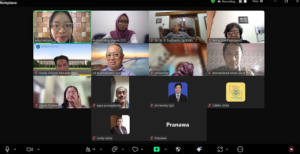
Yogyakarta, 20 Desember 2024 — Center for Bioethics and Medical Humanities (CBMH UGM) menggelar diskusi finalisasi tanggapan terhadap dokumen UNESCO Preliminary Report on the First Draft of The Recommendation on the Ethics of Neurotechnology dengan lancar. Kegiatan ini bertujuan untuk memberikan tanggapan dan masukan tertulis perbaikan draft rekomendasi etika neuroteknologi yang akan dikirimkan ke UNESCO yang nantinya dijadikan pedoman etika neuroteknologi. Acara ini dihadiri oleh tim UNESCO Chairs Bioethics UGM, pihak pemangku kepentingan, pembuat kebijakan, dan pakar praktisi dalam aplikasi neuroteknologi di Indonesia. Kolaborasi ini mendukung Sustainable Development Goals (SDGs) 17 yaitu patnership for goals dengan memperluas kerja sama untuk pembangunan berkelanjutan.
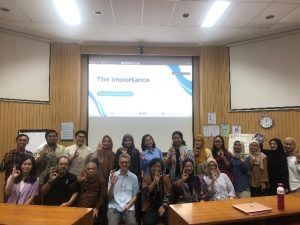
Pusat Kajian Bioetika dan Humaniora Kedokteran (Center for Bioethics and Medical Humanities) UGM sukses menyelenggarakan Program Visiting Professor pada 12-14 November 2024. Program ini menghadirkan Prof. Angus Dawson dari National University of Singapore (NUS) sebagai pembicara utama. Rangkaian acara berlangsung secara hybrid, yakni secara luring di Fakultas Kedokteran, Kesehatan Masyarakat, dan Keperawatan (FK-KMK) UGM dan daring melalui Zoom Meeting.
Kegiatan ini diawali pada 12 November 2024 dengan workshop bertajuk “Join Manuscript and Research/Project on Public Health Ethics”. Workshop tersebut bertujuan memperkuat kolaborasi riset terkait etika kesehatan masyarakat. Di hari berikutnya, dilaksanakan diskusi santai saat makan siang (lunch discussion) yang membahas bioetika dan edukasi humaniora. Selain itu, diselenggarakan kegiatan “Rabuan”, sebuah seminar rutin yang membahas topik kesehatan masyarakat. Rangkaian kegiatan ini semakin menarik dengan sesi pertukaran pengalaman (“exchange works/experience”) yang mempertemukan berbagai pandangan dari peserta yang hadir.
Center for Bioethics and Medical Humanities Universitas Gadjah Mada (CBMH UGM) kembali mengadakan acara rutin Raboan, kali ini dengan tema “Family Decision Making”. Acara yang diselenggarakan melalui Zoom pada hari Rabu, 8 Oktober 2024, menghadirkan dr. Lintang Sagoro yang merupakan mahasiswa S2 Harvard Medical School sebagai pembicara utama. Webinar ini diikuti oleh mahasiswa, akademisi, serta praktisi kesehatan yang tertarik pada isu etika dan kebijakan medis.
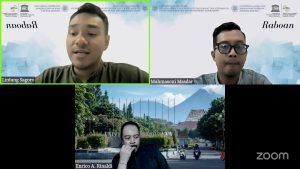
dr. Lintang membuka diskusi dengan menggarisbawahi pentingnya peran keluarga dalam pengambilan keputusan mengenai perawatan pasien dengan penyakit berat. “Keputusan medis bukan hanya tentang terapi yang akan diberikan, tetapi juga tentang bagaimana menjaga kualitas hidup pasien, baik dari sisi fisik maupun emosional,” ujarnya. dr. Lintang menekankan bahwa komunikasi yang jujur dan transparan antara pasien, keluarga, dan tenaga medis sangat penting dalam menjaga kesejahteraan pasien, terutama dalam konteks perawatan paliatif.
Yogyakarta, 2 Oktober 2024 – Center for Bioethics and Medical Humanities (CBMH) Fakultas Kedokteran, Kesehatan Masyarakat, dan Keperawatan Universitas Gadjah Mada (FKKMK UGM) kembali menyelenggarakan webinar RABOAN bertajuk “Ethics and Moral Dilemma: Approaches For Solving Ethical Dilemmas”. Acara ini menghadirkan Dr. Johanes Haryatmoko, SJ., pakar etika sosial, sebagai narasumber utama, dengan Prof. Syafaatun Almirzanah, M.A., M.Th., Ph.D., D.Min. sebagai moderator.
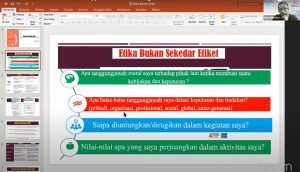
Webinar ini membahas pendekatan etis dalam mengatasi dilema moral, terutama di bidang kesehatan, dengan menggunakan prinsip-prinsip seperti deontologi, utilitarianisme, proporsionalisme, dan komunitarianisme. Diskusi ini menggarisbawahi pentingnya refleksi mendalam dalam pengambilan keputusan yang etis dan adil, sebuah prinsip yang selaras dengan tujuan Sustainable Development Goals (SDGs) 3 mengenai kehidupan sehat dan kesejahteraan serta Sustainable Development Goals (SDGs) 16 mengenai perdamaian, keadilan, dan kelembagaan yang tangguh.
Yogyakarta, 22 November 2024 — Center for Bioethics and Medical Humanities (CBMH) UGM, telah menyelenggarakan Deklarasi Hidup Sehat di Lapangan Segoro Amarto RW 13, Kelurahan Kricak, Yogyakarta. Acara ini merupakan puncak dari rangkaian kegiatan pengabdian masyarakat yang telah dilaksanakan sejak tahun lalu, dengan tujuan meningkatkan literasi kesehatan dan assertiveness masyarakat terhadap layanan kesehatan. Rangkaian pengabdian masyarakat ini mendukung Sustainable Development Goals No. 3 Good Health and Wellness dengan harapan mendukung Sustainable Development Goals No. 11 Sustainable Cities and Communities.
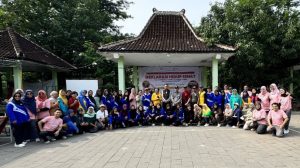
Yogyakarta, 18 November 2024 – Pusat Bioetika dan Humaniora Kesehatan (CBMH) Universitas Gadjah Mada (UGM) menyelenggarakan lunch discussion dan sharing of experience bersama Prof. Christoph Stückelberger, pendiri dan Honorary President dari Globethics. Diskusi yang berlangsung di Gedung Penelitian dan Pengembangan FK-KMK UGM ini berfokus pada metode pengajaran etika serta bagaimana kebijakan berbasis etika dapat diterapkan di berbagai sektor. Acara ini dihadiri oleh akademisi, praktisi, dan anggota komite yang bergerak di bidang bioetika dan humaniora kesehatan.
Yogyakarta, November 6-8, 2024 – The International Bioethics and Humanities Conference (IBHC) 2024 gather global experts to discuss critical issues in bioethics, humanity, technology, and environmental sustainability. Held at Alana Hotel Yogyakarta, this multidisciplinary event explores themes such as biobanking, bioethics education, precision medicine, and ethical considerations for environmental sustainability.
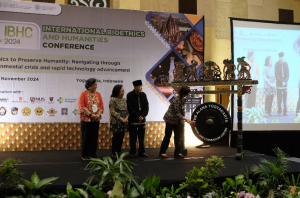
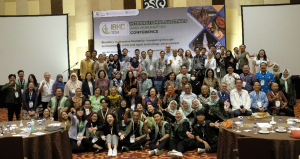
The IBHC 2024 symposiums cover key topics in bioethics, such as biobanking ethics in Southeast Asia, focusing on informed consent, privacy, and equitable data management to support health innovation. Bioethics education is discussed in the context of its integration into higher education through interactive methods to nurture ethical leadership. Precision medicine addresses challenges in data privacy, dynamic consent, and equitable access to genomic technologies, while healthcare ethics explores dilemmas in palliative care, rare diseases, and the importance of cultural values in medical decision-making. Other topics include the integration of traditional medicine, ethical research practices, and the role of local culture in environmental sustainability through eco-village development and natural dye revitalization.
The International Bioethics and Humanities Conference (IBHC) 2024 successfully commenced at the Alana Hotel, Yogyakarta, bringing together academics, professionals, and practitioners from across the globe to address pressing issues in bioethics, health, and humanities. Held from November 5-8, 2024, the event featured a pre-conference day on November 5 and the main conference from November 6-8.
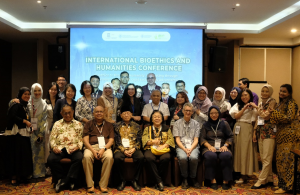
The pre-conference included workshops on several key topics. “Decolonizing Bioethics” which organized by South-East Asian Bioethics Network (SEABION) focused on the need to prioritize local perspectives in addressing ethical challenges. Another session, “Clinical Ethics Support” introduced tools like Moral Case Deliberation (MCD) to help healthcare professionals handle ethical dilemmas and make better decisions. This session was delivered by Professor Albert Molewijk from Amsterdam UMC. A workshop on “Palliative and End-of-Life Care” highlighted the importance of compassionate communication, involving family and spirituality to provide better support for patients. There was also a session on “Pelatihan dan Pengembangan Komite Etik Penelitian” which covered how to build strong, independent committees to oversee ethical research, especially in the era of big data and advanced technology.
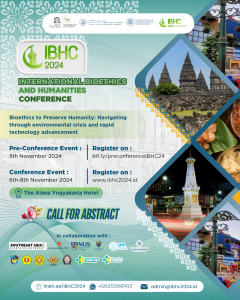
🌍 Join the International Bioethics and Humanities Conference (IBHC) 2024! 🌱
Get ready for an insightful journey where global experts and thought leaders converge to discuss how bioethics can shape the future of humanity amidst today’s greatest challenges. Whether you are a researcher, practitioner, or student, this is your opportunity to explore groundbreaking ideas, share your research, and network with experts from around the world! 🌍
Event Details:
🗓 Pre-Conference Workshop: 5th November 2024
🗓 Main Conference: 6th-8th November 2024
📍 Location: The Alana Yogyakarta Hotel, Indonesia

